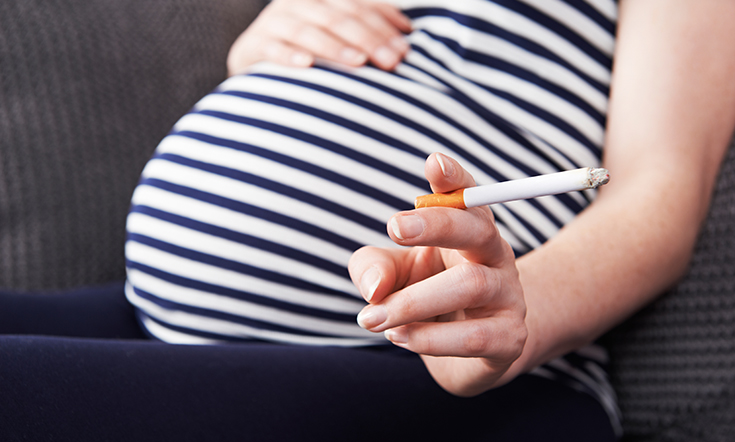

Protecting your baby from tobacco smoke is one of the best things you can do to give your child a healthy start in life. It’s never too late to stop. Every cigarette smoked in pregnancy harms the unborn baby. Statistics have proved that 14.5% of women are smoking during pregnancy and gives birth to smaller babies than non-smokers, and smoking after the 16th week of pregnancy has also been statistically proved to cause both mental and physical retardation in a small number of cases in late childhood.
Effects Of Smoking To You And Your Baby
Compared to babies in women who don’t smoke, babies exposed to cigarette smoke during pregnancy tend to receive less food and oxygen. This happens because when you smoke your baby and the placenta are will have fewer amounts of oxygen and nutrients. The placenta then spreads further throughout the uterus, trying to seek out more surface area of the uterus from which to draw oxygen and nutrients. Yet, because it spreads out, it becomes thinner thereby increasing the risk of placenta previa and placenta abruption.
Because of less oxygen in the body, your baby is more likely to be born with a low birth weight, which is associated with many health problems including poor lung function. Smoking can also lead to preterm labour or a premature rupturing of the membranes because the body feels that the baby can no longer be fed properly. Here are other common effects of smoking to you and your baby during pregnancy:
Babies
- This effect increases proportionally. The more you smoke, the less the child weighs. Your baby may have a birth weight on average 200g (7oz) less than those born to non-smokers.
- Babies get ill more frequently. Babies born to women who smoked 15 cigarettes or more a day during pregnancy are taken into hospital twice as often during the first eight months of life.
- Your baby may also get painful diseases such as inflammation of the middle ear and asthmatic bronchitis more frequently in early childhood.
- Vital body organs that is smaller on average than babies born to non-smokers.
- There seems to be a direct link between cot death and parents smoking.
- Your child is more likely to become a smoker in later years.
- May develop poorer lung function.
Mums
- Increased risk of preterm birth. Babies born prematurely can suffer more breathing problems and have long hospital stays among other health problems.
- Increased risk of placental abruption. This is when the placenta separates from the wall of the uterus, denying all oxygen to your baby.
- Increased risk of miscarriage or stillbirth. Smoking is believed to be responsible for 115,000 miscarriages a year and 5,600 stillbirths.
- Increased risk of placenta previa, a dangerous condition whereby the placenta covers the cervix.
- Pregnant women who smoke increase their risk of early miscarriage.
- There is also an increased risk of an ectopic pregnancy.
Giving Up Smoking
Cigarette smoking is dangerous to your health, however giving up smoking isn’t easy. But now that you’re pregnant, you probably know that giving up has never been more important. The sooner you stop the better. But stopping even in the last few weeks of pregnancy can be beneficial. If your partner or anyone else who lives with you smokes, their smoke can affect you and the baby both before and after birth. They can help you and the baby by giving up now. Perhaps you could try to stop together. Here are some more tips on how to quit smoking.
- Write down your reasons for quitting. Look at the list when you are tempted to smoke
- Choose a “quit day.” On that day, throw away all your cigarettes, lighters and ashtrays
- Identify your motivation for smoking. Once you do this, you should be able to find substitutes
- Stay away from places, activities or people that make you feel like smoking
- Ask your partner or a friend to help you quit and call that person when you feel like smoking
- Ask your health care provider about quitting aids such as patches, gum, nasal spray and medications. However, don’t start using these without your health care provider’s okay especially if you are pregnant
- Don’t get discouraged if you don’t quit completely right away. Keep trying. If you can’t quit, cut back as much as you can.
If you can stop smoking before or during your first three months of pregnancy:
- You reduce your risk of complications during the birth and have a better chance of a safe labour and birth for you and your baby.
- You lower the risk that your baby will be born too early (babies born early are more likely to have serious health problems than babies born at or near their due date).
- Your baby has the same chance of having a healthy birth weight as a baby of a non-smoker (babies who have a low birth weight as a result of smoking can have health problems because they are so small).
- You reduce the risk of the baby suffering illness during their early years and of the baby dying at, or after, birth.
If you stop smoking later in your pregnancy:
- Your baby has a better chance of having a healthy birth weight.
- It helps your baby practice their breathing movements to get ready for birth.
Conclusion
It is never too late to stop smoking. Every cigarette you decide not to smoke will help your and baby’s health. Much of the damage caused by smoking can be reversed because your body is a living organism that has the ability to heal itself. Women who stopped smoking at the halfway point in their pregnancy gave birth to babies with the same average weight as women who had not smoked at all during pregnancy.
For more information on how to quit smoking see quite smoking website






















